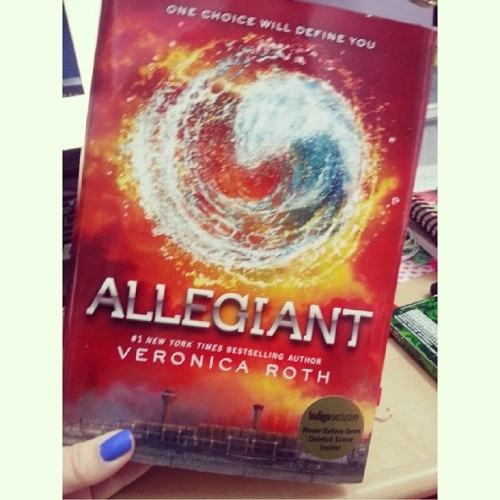
I understand heavily why people dislike Allegiant so much. The end was devastating and heartbreaking, but that’s just exactly why the ending is perfect.

Anyways, before we get to discuss the ending, can I just say that Four is so just. . . . THERE ARE NO WORDS. He is so <3. Anyways, I really liked the dual point of view narrating. The past two books have all been in Tris’ point of view and the only time we get to really see what Four is thinking is through the novella. Also, I like that Tris and Four question their relationship with each other. Though that may not be ideal for fans whose OTP is FourTris, it gives more complexity to their relationship. I like that they are unsure of each other and that they question their feelings and doubt themselves.
Their love is beautiful. I mean. C’mon.
“Just as I have insisted on his worth, he has always insisted on my strength, insisted that my capcacity is greater than I believe. And I know, without being told, that’s what love does, when it’s right – it makes you more than you were, more than you thought you could be.”
“But now I know I am like the blade and he is like the whetstone – I am too strong to break so easily, and I become better, sharper, every time I touch him.”
The idea of choices and decisions are brought up. In what circumstances is it ethical to take away someone’s choice? What choice would we make ourselves? Peter chose to have his memory taken away and Four gave Evelyn the choice of choosing either being the tyrannical leader of the Factionless without him at her side, or to give up her reign and have him as her son. Tris made the hard choice of going on the mission instead of Caleb. They all make choices that are harder than any person should have to make. It makes the reader question the choices that they will make themselves and question what they are willing to fight for.
There is also the idea of the experiment vs. the scientist. Chicago, the experiment, is now self-aware and aware that they are the experiment. The scientists in the Bureau of Genetic Welfare talk about resetting the experiment and wiping their memory. It is clearly unethical to wipe the memories of the people, but they see it as an experiment that they are controlling and not the people themselves. The question is, how far is too far for the greater good?
The whole issue with the Genetically Pure and the Genetically Damaged is a good reflection upon our own society and the inequality. What would it be called? Geneticism?
Anyways, onto the ending. *sob*
I feel like though it is something that we could probably see coming, it is still unexpected. It’s always kind of unexpected when a character dies. It is just generally a thing that doesn’t happen for a main character to die, especially if they are narrating the story. In hindsight, I can see how Tris’ death was foreshadowed, with the dual points of view, the mentioning of how Tris was lead to her execution and how she is always running head on into dangerous situations.
This was a spectacular ending to a spectacular series and I commend Veronica Roth for having the guts to kill off a main character, even if it is an unpopular decision. The entire series is well plotted and well written, and the Divergent series will always have a spot on my all-time favourites list.
Well Done.
Happy Reading, Y'all!
Comments
Post a Comment